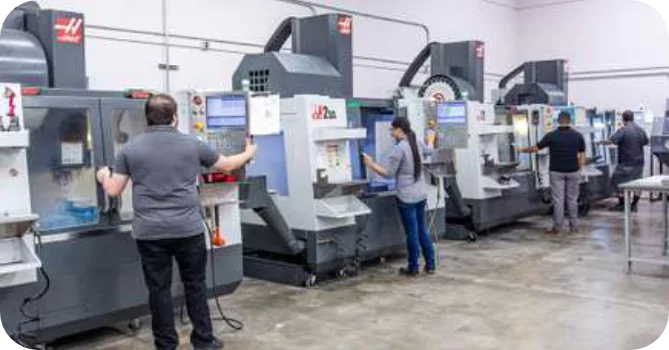
Prototype Mold Fabrication
What is Prototype Mold Fabrication?
Typically, early mechanical and functional testing is completed using 3D printed parts in small quantities of 1-10 ea. 3D printing is well suited for early testing because it can be quickly fabricated and iterated. However, 3D printing drawbacks include poor feature accuracy compared to injection molded parts, and the materials used for 3D printing do not accurately replicate injection molded materials. Therefore, 3D printed parts cannot be used to fully develop a product from start to transfer to manufacturing. It takes a lot of experience developing injection molded products to determine when 3D printed parts are no longer valuable, and it becomes necessary to switch to prototype molded parts.

Some issues can occur if the switch to prototype molded parts is made either too soon or too late. If the switch is made too soon, then too many iterations would need to be made in the prototype mold, increasing cost, extending development time, and potentially impairing the prototype mold life as excessive mold changes are completed. If the switch to prototype molded parts is made too late, then testing observations and iterations using 3D printed parts have exceeded their capability to yield useful test results. This can be misleading as the engineer pursues design changes in a direction that would otherwise not have occurred if prototype molded parts were properly used. The result has the potential to significantly increase costs and extend development time if the engineer is substantially off track from a successful final design.
When to Utilize Prototype Injection Molding (Also Known as Prototype Tooling)
The typical rule of thumb is for the engineer to prove approximately 80% of product function in 3D printed parts and then switch to testing using prototype molded parts. Prototype molds have the added benefit that a large number of parts using the injection molded plastics to be used in manufacturing may be produced to support critical late development activities such as clinical trials, user studies, marketing samples, design verification, bridge tooling, etc. It’s important that the engineer estimates the number of prototype molded parts needed to complete development and support these activities. The number of parts that can be yielded from a prototype mold highly depends on its fabrication method. Some prototype molds are useful for less than 50 parts, which is why it’s important for the engineer to know how many prototype molded parts they will need before selecting a prototype mold fabrication method. Protoshop’s prototype molds are fabricated to be much more robust than typical prototype molds, with a life expectancy of over 100,000 ea. Since it’s rare for a development project to require more than 20,000 ea, it’s reassuring for the engineer to know that Protoshop’s prototype molds can far exceed their needs.
Prototype Tooling Key Features

Rapid prototype molds typically completed within 1 week

Typically prototype mold life expectancy
is up to 100,000 cycles
Can be used for bridge tooling.

Feature tolerance 0.025 -0.1 mm
(0.001″ – 0.004″)

Mold iteration typically completed within 1 day

Insert and overmolding compatible

No limitation to part geometry complexity
Part Information & Lead Time

Lead Time
Typically, in 1 week, we will indicate the lead time when we provide your quote.

Maximum Molded Part Size
Part may be up to 8″ x 6″ x4″ (200 x 150 x 100 mm)

Maximum Part Volume
Shot volume up to 6 oz (170 g)

Tolerance
Typically <0.004″ (0.1 mm).
Tolerance of 0.001″ (0.025 mm) is possible with certain materials and part geometry. Let’s discuss your application.
How Do We Do It?

Personalized moldability review. We provide our customers with an online moldability review of their part models to indicate where the defects of molding prototypes are anticipated to occur and why. We believe that customer education and collaboration is critical to our goal of delivering successful molded prototype parts that meet your needs with fewer iterations. This allows our customers to transfer products to market faster and with lower risk.

We invest in the highest, production quality CNC milling machines and injection machines to fabricate and run our prototype molds. It’s overkill for prototype injection molding but necessary to achieve our goal of replicating production mold quality. The higher quality CNC mills also allows us to machine molds faster with fewer error and greater accuracy.

We have developed a proprietary method of prototype molding that closely replicates production quality with a lead time that is faster and at lower cost than competitors. Thousands of parts per week may be molded.

Our proprietary method of prototype injection molding includes both heating and cooling of mold cavities which ensures a more accurate and repeatable injection molding process that is typically only found in production molding. This also allows us to process challenging plastic materials that other prototype molders are unable to run.
Why You Should Use Our Fabrication/Prototype Tooling Services for Your Molded Prototypes
Personalized Injection Molding Services
We recognize that not every engineer who develops products is an injection molding expert. Most prototype molders provide automated moldability feedback, which tends to be incomplete and often does not tell you why indicated areas are an issue. Protoshop provides clients with a thorough moldability review at no cost. We then meet with our clients over Zoom, review each opportunity for moldability improvement, and explain why there is an issue. Protoshop feels that it is critical for the success of our clients to provide a collaborative review and education about how their part models may be improved. We’ve found that this yields superior molded parts that meet customer requirements the first time and minimize development time.
Extensive Prototype Molding Experience
Protoshop was founded by engineers and mold makers with many years of experience in the medical product development industry. Protoshop has extensive experience in plastic mold tooling design and prototype molding. We have been clients to many prototype molders and found them all to be insufficient to our needs. They typically suffered from a combination of insufficient customer support, poor quality, long lead times, and high cost. We recognized that we could do better and apply our experience in prototype molding to create a better client experience…. Protoshop was born.
Superior Customer Experience
Protoshop has invested in providing a superior customer experience through our advanced website. The website improves our goals of clear communication with our clients and thorough documentation. Our website informs customers by email when the project status changes, so you are aware of progress up to the minute. When parts are shipped, customers automatically receive FedEx tracking details and inspection reports. Requests to mold parts and to iterate molds are quickly and easily completed on the website. The complete history of your project is always available including quotes, packing slips, inspection reports, and mold iterations that can be viewed and downloaded at any time. Non-disclosure agreements can be quickly executed through the website. Payment options have been expanded to include corporate checks, ACH, purchase orders, and credit cards.
Hear From Our Satisfied Customers
Prototype Mold Fabrication FAQS
Why Should I Choose Protoshop Over Other Services for Prototype Mold Creation and Injection Molding?
Choosing Protoshop comes with distinct benefits:
- Exceptional Mold Standards: Our prototype molds are crafted with precision, featuring temperature control and steel construction for critical or delicate sections, ensuring they mirror the quality of production molds.
Expert Design Assessment: Our seasoned engineering professionals will guide your project to success with moldability reviews. - Unrestricted Design Possibilities: Been turned down by other molders or told it’s unfeasible? Challenge us. We pride ourselves on pushing the boundaries of molding and embracing complex tasks.
- Swift Mold Modifications: With our roots in product development, we understand the significance of mold adjustments. We’re geared to make rapid changes, even those that are not metal-safe, usually within a span of 1-2 days.
After Getting My Mold Crafted and Submitting a Request for Molded Components, How Soon Can I Expect Them?
We strive to deliver molded components within one day of receiving your request.
Do You Offer a Sample Post Mold-Creation Process?
Yes, with every mold fabrication quote from Protoshop, we include mold set-up, mold troubleshooting and processing, and a set of 25 sample parts. Out of these, we randomly pick 3 parts and inspect 3 dimensions on each to ensure precision. This standard inspection of 3 parts / 3 dimensions comes at no extra cost. Should you need more parts or dimensions inspected, you can specify that requirement during the quotation process.
Contact Protoshop Today
Protoshop is ready to help make your project a success! After registering, upload your CAD model and schedule a Zoom meeting with one of our experienced engineers. We’ll work with you to refine your CAD model to ensure your prototype molded parts meet product requirements.
You’ll have parts in hand, ready to test in a few days.

